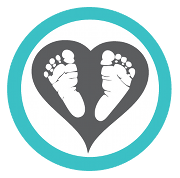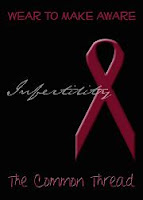Loss is such a hard and tricky thing. I've blogged in the past about crazy and insensitive things that people have said and done. I've linked to other's lists of said craziness. It seems when loss is the case, people struggle with foot-in-mouth syndrome, and I've compiled a brief list of ways to avoid it.
Just today, I was responding to a friend who recognizes there were probably different ways she could have handled the losses of others in her life, which is where this list comes from. Ultimately, who knows what's right and what's wrong? She may have said the right thing, she may have done the wrong thing, and whatever that thing was may vary in its rightness or wrongness from person to person and from loss to loss. My list is not at all inclusive, but rather just some ideas of things to try and to definately avoid based exclusively on my own experience. (Note: the book I've mentioned time and again -- Hannah's Hope -- offers many specific suggestions to those who minister to others who have lost through infertility, miscarriage, or adoption failure. It's a great book for any ministry catalogue.)
When you've been blessed to have never gone through a loss, it is impossible to understand what that parent is going through. Even when you've been through it, there's little understanding to be had. Some friends and my sister went through loss after loss before I was ever married, and I remember "thoughtful" things I said to them and cringe. Anyway, when you, as someone who hasn't had a loss, deal with someone who has, the most important piece of advice I could give to you is to merely extend compassion, which can be done in a variety of ways.
It means so much to have someone acknowledge your pain without trying to compare. Losing a baby is not like losing a parent or a pet or a friend. Every one of those things is hard, but in a remarkably different way. When someone dies, it's just best to never compare unless you personally understand that specific loss. Losing a dad is not the same as losing a mom. Losing a friend is not the same as losing a brother. Losing a baby is not the same as losing a pet or a job. An early miscarriage is not the same as a late miscarriage or stillbirth (and having had both, I know). Having one stillbirth is not the same as having four, and there's no way that even I can comprehend that pain. (I met a sweet woman last week who'd lost four babies this year -- all between 17 and 23 weeks. I don't know how she's survived.) And, though I have experienced the devestating pain of miscarriage and loss, I am completely aware that my losses in no way compare to losing a child whose lived among a family. Each situation is hard and heartbreaking, so compassion without comparison is key.
It means so much to have someone acknowledge your pain without trying to explain. There is nothing more ridiculous to have someone tell you that God had a better plan which is why your baby died, or that there must have been something wrong with the baby, or that it makes more sense this way because of A or B or C. When you're in the middle of the situation, even knowing that your child had hydrocephaly does not ease the pain. (My child did not have hydrocephaly, but I have another friend whose child did when he died in utero, and she hurt as much as me.) Not one person knows why another person had to die, and it doesn't matter how much people pray, most times things are not ever clearly explained. To try to impose an explanation is often more hurtful than it is helpful, so extending compassion without explanation is key.
How can you extend compassion?
You can extend compassion by helping a friend who has lost try to think of ways to memorialize her child. That baby matters. As God is knitting it together in its mother's womb, He's knitting it together to its mother's heart. When the baby dies and disappears, it takes a part of her heart along. Acknowledging that loss is remarkable -- remembering that something more than just a cluster of developing cells left her means more than you will ever know. There are many ways to memorialize a lost child: a Christmas ornament, a garden stone, a rosebush or tree, a donation made in the child's name, an engraved stone on a pathway (like at a library renovation or something), Willow Tree figurines, scrapbooks, and more.
You can extend compassion by attending to the needs your friend has to be comforted. When you lose a baby, it haunts you forever. The things celebrated in remaining children are bittersweet because the memory of what is no more remains forever. You think of who will never be seven, of who will never look just like their dad, of who will never fall in love with Legos or little girls. One of the sweetest thing friends have done for me personally is recognize strange times when it shouldn't hurt, but does. I'll get the look, or the "How is this for you?" Even if I'm really ok, it's nice to know that people remember and care.
You can extend compassion by remembering dates or seasons. Mommies who have lost babies have a different calendar than the rest. They're filled with anniversaries of dates people easily forget. It's amazing if you remember those specific dates and honor them with a call or a card, but even if all you do is remember a season, it means so much. Due dates, birth dates, and dying dates are all very important, as is Mother's/Father's Day, Christmas, and the Spring (Baby Dedications galore).
You can extend compassion by the random phone call. Today a friend called me about the laundry. She was at home washing baby things today and thought of me. Some random, tedious chore made her think of what was missing in my life, so she called to offer a listening ear. I spent a half-hour with her on the phone crying.
You can extend compassion by being available and being flexible. I had a baby shower to go to that was going to be difficult for me. A dear, dear friend offered to go with me to support me and steal me away if it got too hard. We had plans to meet for coffee beforehand (though I was painfully late), and by going with her, I was able to decompress when we left. During the shower, I got lots of the looks and the queries as to my well-being. I also I think she may have stuffed her bra with tissues, just in case. (Good for wiping noses and for getting a good laugh.) When I did get teary, she covered for me, and didn't argue when I needed to escape.
You can extend compassion by being there. When Zachary died, I lost friends. People who'd been a part of my life for over twenty years disappeared because they didn't know what to say. (Fortunately, I'm blessed with much closer relationships with people who realize there's nothing that can be said. Regardless, it's still sad to lose those old friends.) It's hard to come up with something wise to say, but it's truly better to say nothing "wise" at all. Go after your friend, and don't let the friendship fail. Take her to coffee, or sit with her at home. Watch a movie together, or sit side-by-side and stare into space. Let her talk, or not. Let her eat, or not. When she shakes her head in disbelief, you shake your head too. When she mumbles in that stunned way, agree with whatever she says. When she gets mad, get mad with her. When she cries, don't try to make her stop.
For those who have experienced loss, what are some of the things you wish people had done, or had done differently? For those who've dealt with those who have lost, what are some of your successes or regrets?
"Rejoice with those who rejoice;
mourn with those who mourn."
Romans 12:15
"If one falls down, his friend can help him up.
But pity the man who falls and has no one to help him up!"
Ecclesiastes 4:10



















Great advice from someone who knows all too well. I think it is very important for you to share your experience in order to help others. I admire you. I hope & pray that I have been a compassionate friend. Please forgive me if I have not.
So well written and very insightful for us inexperienced with personal loss. I am forwarding your blog to my sister in law. With our cousin who just lost at 20 weeks 2 months ago, I think this blog could be very helpful for my in-law's family to read. Hope you don't mind me sharing this post.
I am the sister-in-law and I wish you could publish this insightful blog. You are right that no one loss can compare to another - that was so helpful for me to remember. Thank you for sharing your heart and for being honest in such a humble way. Shanan Marek
Oh my gosh! This is my new favorite entry ever.
And did I look a bit busty that day or what? :)
You're the greatest!
Thank you for your words. It was something I needed to hear today.
Thank you for being so open and real! It is very helpful to hear ways to not be ignorant with someone that is hurting.
I love that you and my sister have found each other. I know that she gets frustrated that there are not many people who get her and your friendship has blessed her so much (which in turn blesses those who love her).
thank you thank you thank you. thank you for sharing this so openly; it helps me so much, and guides me in what to say/not to say. good words girl!